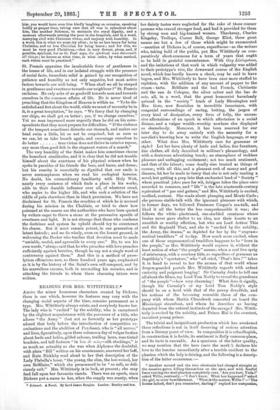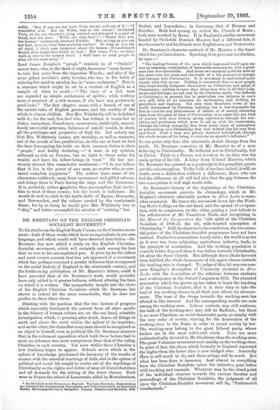READING- FOR MRS. WITTITTERLY.*
AMONG the minor humorous characters created by Dickens, there is one which, however its features may vary with the changing social aspects of the time, remains permanent as a type. Mrs. Wittitterly always exists, and everybody knows her. The lady who is "excited" by the nobility, who is enraptured by the slightest acquaintance with the possessor of a title, who adores " the Army " (but not so fervently as her prototype adored that body before the introduction of competitive ex- aminations and the abolition of Purchase), who is " all nerves," and lives, figuratively, upon three volumes a day of vulgar fustian about lords and ladies, gilded saloons, trailiug laces, rose-tinted boudoirs, and tall footmen " in bas de soie,—silk stockings," is as much an actuality as she was when Alphonse the doubtful, with plain" Bill" written on his countenance, answered her bell, and Kate Nickleby read aloud to her that description of the Lady Flabella's lover, " the young, the slim, the low-voiced, her own Belfilaire," which she pronounced to be " so soft, so deli- ciously soft" Mrs. Wittitterly is in luck, at present; she may feed full upon her favourite viands. There was an epoch, since Dickens put a name to her, when the supply was scanty, when
• Bacourt. A Novel. By Lord James Douglas. London : Bentley and Son.
her dainty tastes were neglected for the sake of those coarser persons who craved stronger food, and had it provided for them by strong men and big-brained women. Thackeray, Charles Kingsley, Trollope, Currer Bell, George Eliot, these great names are but a few of those which might be enumerated —mention of Dickens is, of course, superfluous—as the writers who, taking hold of the public, put Mrs. Wittitterly on com- paratively short-commons for a term of years that ought to be held in grateful remembrance. With Guy Liuingafone, and the imitations of that work in which vulgarity was added to their prototype's vice, the downward course of the English novel, which has hardly known a check, may be said to have begun, and Mrs. Wittitterly to have been once more stuffed to repletion, with the addition of any amount of pepper to the cream - tarts. Belfilaire and the bad French, Ch6rizette and the eau de Cologne, the silver salver and the bas de soie, all, in a word, that the great humourist harmlessly quizzed in the " society " trash of Lady Blessiogton and Mrs. Gore, now flourishes in incredible luxuriance, with congenial surroundings of racing, betting, the jargon of every kind of dissipation, every form of folly, the succes- sive affectations of an epoch in which affectation is a social disease, and a vulgar wealth-worship nowhere else displayed so shamelessly. Moreover, it has been reserved for our later day to do away entirely with the necessity for a novelist's knowing how to write the English language, or any other. What does Mrs. Wittitterly care for grammar or style P Let her have plenty of lords and ladies, fine furniture, fine clothes, all duly described in milliner's phraseology, and with a dexterous advertising touch ; an atmosphere of reckless pleasure and unflagging excitement; not too much sentiment, and that of the falsest ; some deadly sins treated as things of course; with all this, and a pleasant reek of money and good dinners, let her be made to fancy that she is not only reading a novel, but getting a peep into that enchanted land of " Society " where practical jokes pass for wit, intrigue takes the place once accorded to romance, and " life " is the late nineteenth-century equivalent of " gas and gaiters," and Mrs. Wittitterly is excited, soothed, content. She reads about plunging and Monte Carlo; she peruses stable-talk with the ignorant pleasure with which, in former days, we followed Fenimore Cooper's sea-talk, and liked it all the better the less comprehensible it was; she follows the white - plastroned, one-studded creatures whose brains never gave shelter to an idea, nor their hearts to an unselfish or worthy affection, but who are Lord Arthur This and Sir Reginald That, and she is "excited by the nobility, the Army, the drama," as depicted for her by the " ungram- matical twaddlers " of to-day. How much more excited, when one of those ungrammatical twaddlers happens to be " born in the purple," as Mrs. Wittitterly would express it, without the least notion of what " the purple" means; when a real live sprig of aristocracy, with a courtesy title, as regardless of grammar as Ingoldsby's " spectators," who " all cried, ' That's him !' " takes it in hand to reveal to her the arcane of that world whose dragon-guarded portals Mrs. Wittitterly regards with ardent curiosity and poignant longing! Sir Carnaby Jenks to tell one all about the Blues, my Lord Tom Noddy to reveal the grandeurs of " the purple "—how very charming ! What does it signify, though Sir Carnaby's or my Lord Tom Noddy's style should be on a level with that of the penny dreadfuls, and his notions of the becoming resemble those of the com- pany with whom Martin Chnzzlewit consorted on board the Mississippi steamboat, and whom he describes as having departed from the natural instincts of the savage P Mrs. Wittit- terly is excited by the nobility, and Prince Hal is the sweetest, rascaliest young prince.
The trivial and insignificant production which has awakened these reflections is not in itself deserving of serious attention from a literary point of view. In composition it is schoolboyish, in construction it is feeble, its sentiment is flatly common-place, and its taste is execrable. As a specimen of the latter quality, we may mention that the hero (save the mark !) declares his love to the heroine immediately after a terrible accident to the phaeton which the lady is driving, and the following is a descrip- tion of the latter occurrence :—
" Another second and the two chestnuts had charged straight at the massive gates, killing themselves on the spot, and with fearful force turning the mail phaeton completely over. 'Are you hurt, Viola P asked Willie, anxiously.—'I don't know. What has happened ?' asked the girl, in utter bewilderment. ' What is the matter, Willie P—' The horses bolted, don't you remember, darling ?' replied her companion, softly. 'But, if you are not hurt, Viola, we are well out of remember now. But oh, Willie, look at the horses r exclaimed Viola, as the two chestnuts, lying twisted and distorted in a pool of blood, met her gaze. Willie, are they dead F'—' Thank Gud, yes, the brutes!' vindictively returned Eskdalo. ' But, so long as you are sot hurt, dearast, what does anything matter ? So long as you are all right, I don't care twopence about the horses—ill-conditioned brutes, they might have killed us both ! But come, Viola, we must walk at once to the nearest hotel. I shall have to send people to clear all this mess away.' "
Lord James Douglas's " people " reminds us of " Ouida's ' recent hero, who, in the dead of night, harnesses "some horses" to take him away from the imperious Wanda ; and also of the same gifted novelist's early heroine, who was in the habit of ordering her maid to envelop her in "some cashmeres." Here is a sentence which might be set to a student of English as a sample of what to avoid :—" The vices of a rich man are regarded as simple exuberance of spirits ; while nothing more is required of a rich woman, if she have any pretence to good looks." The first chapter opens with a breach of one of the easiest rules of English grammar, and the crudity of the whole is almost childish. But Mrs. Wittitterly will be delighted with it ; for the real, live lord who has written it treats her to dukes, marquises, Guardsmen, racecourses, stable-talk, marvel- lously successful actresses, heiresses of untold wealth, in short, all the privileges and properties of high life. Let nobody say that Mrs. Wittitterly cannot get morality, as well as manners, out of the novels of her predilection ; in this one at least we find the hero haranguing his bride on their common duties to their " people," and boldly declaring :—" A man, in my opinion, although as rich as Crcesus, has no right to throw away his wealth and leave his fellow-beings in want." He has pre- viously uttered this remarkable sentiment :—" I do not believe that it lies in the power of any man, no matter who, to com- mand complete happiness." The author tears some of his characters ruthlessly away from racecourses and gilded saloons, and brings them to Paris during the siege and the Commune.
It is, probably, rather mi m pli city than presumption that incites him to treat of those events ; but the result is ludicrous. He would do well to stick to the battle-fields of Epsom, Doncaster, and Newmarket, and the colours carried by the combatants there ; for by so doing be would give Mrs. Wittitterly less to "skip," and better accomplish his mission of " exciting " her.



































 Previous page
Previous page